Has MCP Won?
This week: MCP, thinking budgets, disentangling cognitive ability
Why MCP Won
MCP = Model Context Protocol
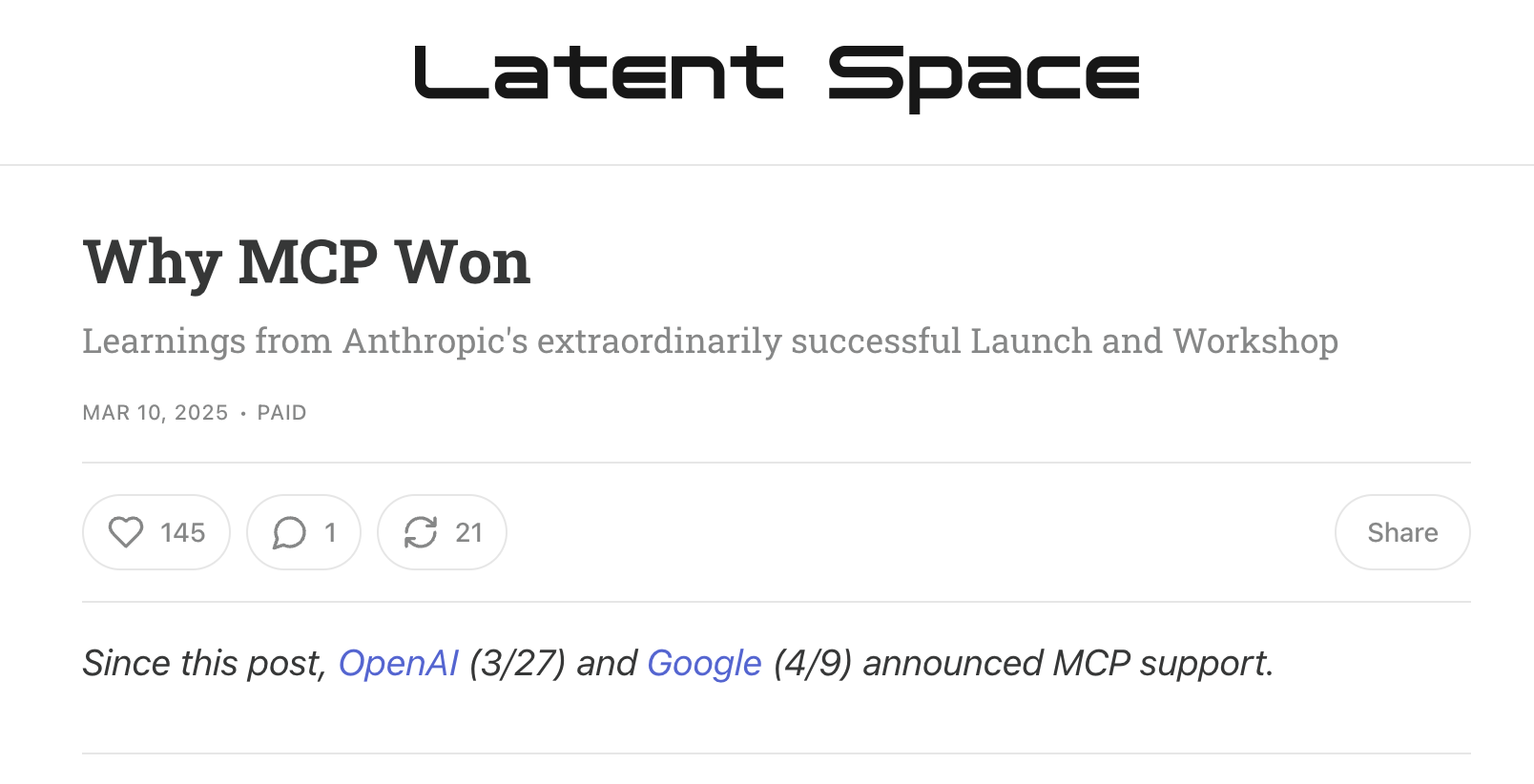
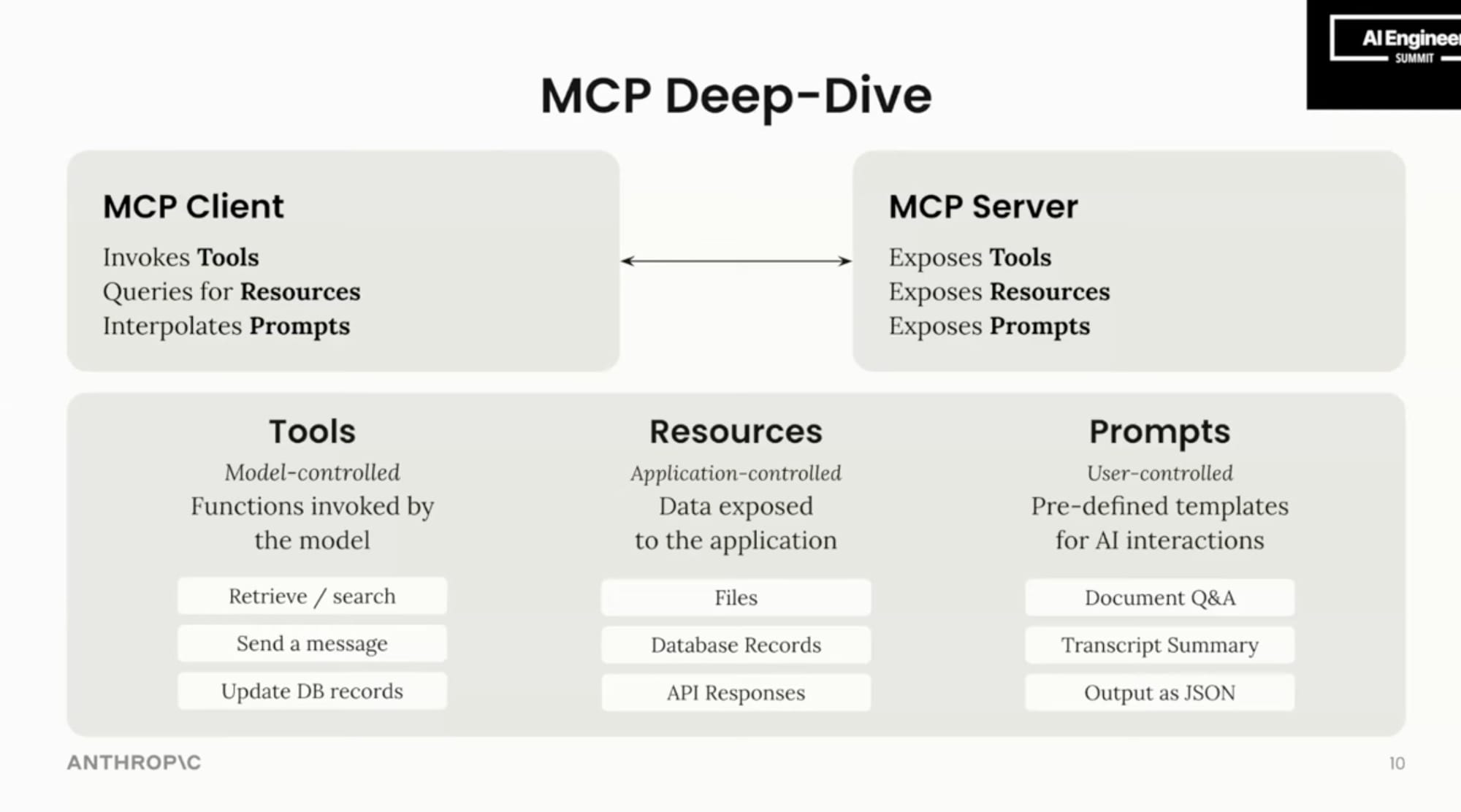
“To paraphrase Ben Thompson, the #1 feature of any network is the people already on it. Accordingly, the power of any new protocol derives from its adoption (aka ecosystem), and it’s fair to say that MCP has captured enough critical mass and momentum right now that it is already the presumptive winner of the 2023-2025 “agent open standard” wars.”
“Why MCP Won (in short) aka “won” status as de facto standard, over not-exactly-equivalent-but-alternative approaches like OpenAPI and LangChain/LangGraph. In rough descending order.
- MCP is “AI-Native” version of old idea
- MCP is an “open standard” with a big backer
- Anthropic has the best developer AI brand
- MCP based off LSP, an existing successful protocol
- MCP dogfooded with complete set of 1st party client, servers, tooling, SDKs
- MCP started with minimal base, but with frequent roadmap updates
- Non-Factors: Things that we think surprisingly did not contribute to MCP’s success
- Lining up launch partners like Zed, SourceGraph Cody, and Replit
- Launching with great documentation”
https://www.latent.space/p/why-mcp-won
Google’s Gemini 2.5 Flash introduces ‘thinking budgets’ that cut AI costs by 600% when turned down
Haha, jokes on you, I’m not that stupid…my thinking budget is merely optimized for this conversation
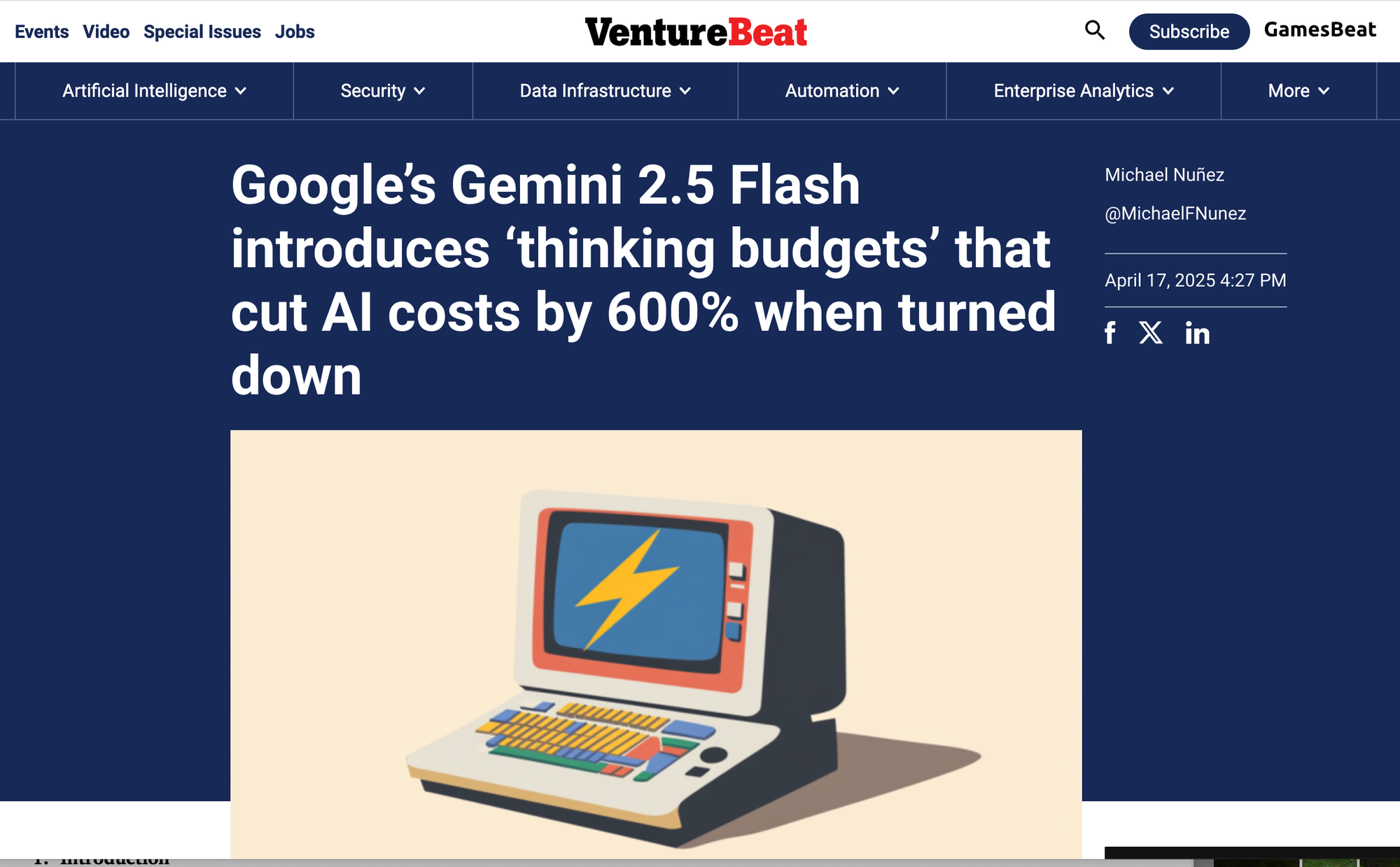
Google has launched Gemini 2.5 Flash, a major upgrade to its AI lineup that gives businesses and developers unprecedented control over how much “thinking” their AI performs.”
“When using Gemini 2.5 Flash, developers pay $0.15 per million tokens for input. Output costs vary dramatically based on reasoning settings: $0.60 per million tokens with thinking turned off, jumping to $3.50 per million tokens with reasoning enabled.
This nearly sixfold price difference for reasoned outputs reflects the computational intensity of the “thinking” process, where the model evaluates multiple potential paths and considerations before generating a response.”
From Google:
“Prompts requiring low reasoning:
Example 1: “Thank you” in Spanish
Example 2: How many provinces does Canada have?
Prompts requiring medium reasoning:
Example 1: You roll two dice. What’s the probability they add up to 7?
Example 2: My gym has pickup hours for basketball between 9-3pm on MWF and between 2-8pm on Tuesday and Saturday. If I work 9-6pm 5 days a week and want to play 5 hours of basketball on weekdays, create a schedule for me to make it all work.
Prompts requiring high reasoning:
Example 1: A cantilever beam of length L=3m has a rectangular cross-section (width b=0.1m, height h=0.2m) and is made of steel (E=200 GPa). It is subjected to a uniformly distributed load w=5 kN/m along its entire length and a point load P=10 kN at its free end. Calculate the maximum bending stress (σ_max).
Example 2: Write a function evaluate_cells(cells: Dict[str, str]) -> Dict[str, float] that computes the values of spreadsheet cells.”
https://developers.googleblog.com/en/start-building-with-gemini-25-flash/
Informed or Overwhelmed? Disentangling the Effects of Cognitive Ability and Information on Public Opinion
“exposure to information tends to benefit citizens who are already skilled at parsing it while hindering those who already struggle to keep up”
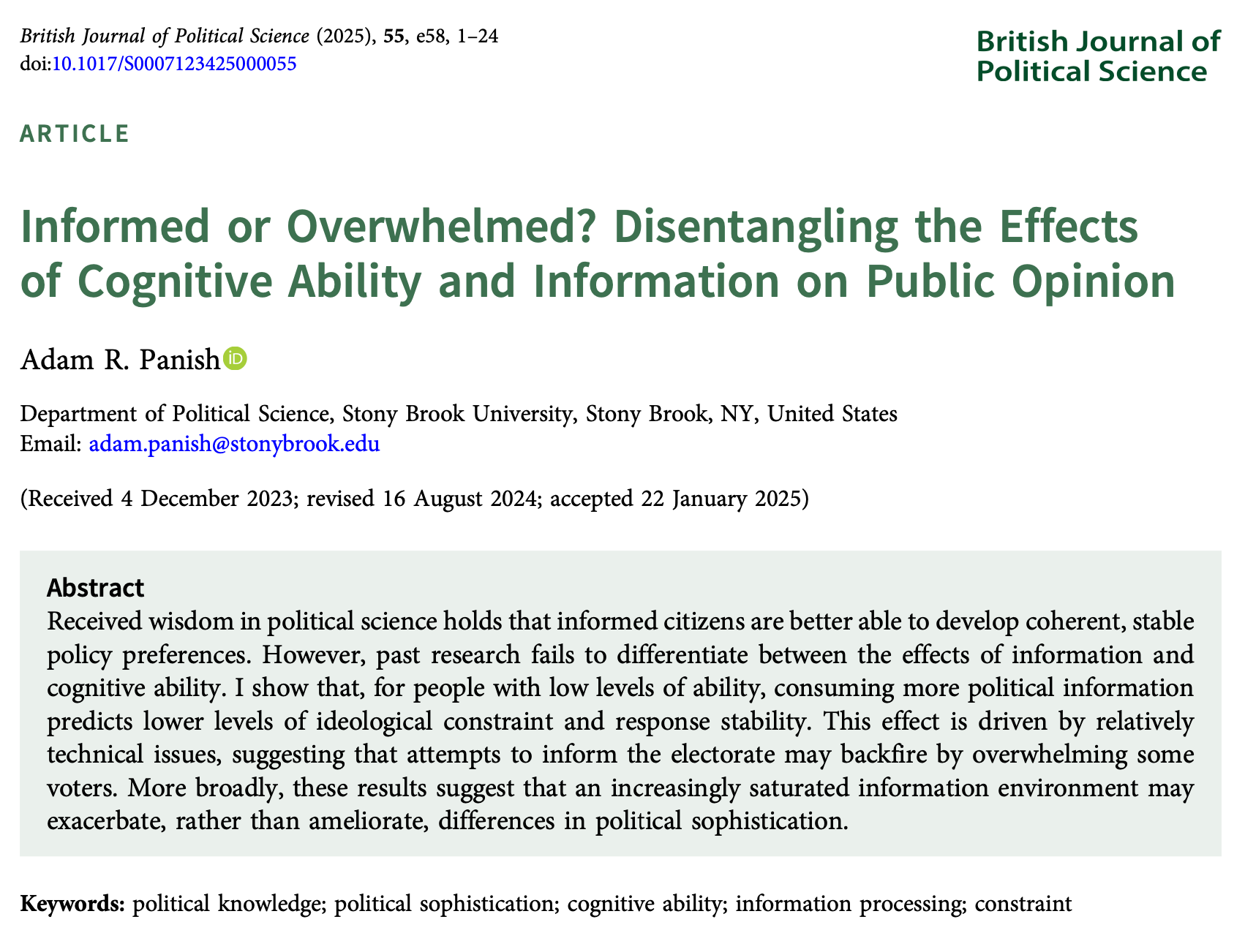
“I show that, for people with low levels of ability, consuming more political information predicts lower levels of ideological constraint and response stability. This effect is driven by relatively technical issues, suggesting that attempts to inform the electorate may backfire by overwhelming some voters. More broadly, these results suggest that an increasingly saturated information environment may exacerbate, rather than ameliorate, differences in political sophistication.”
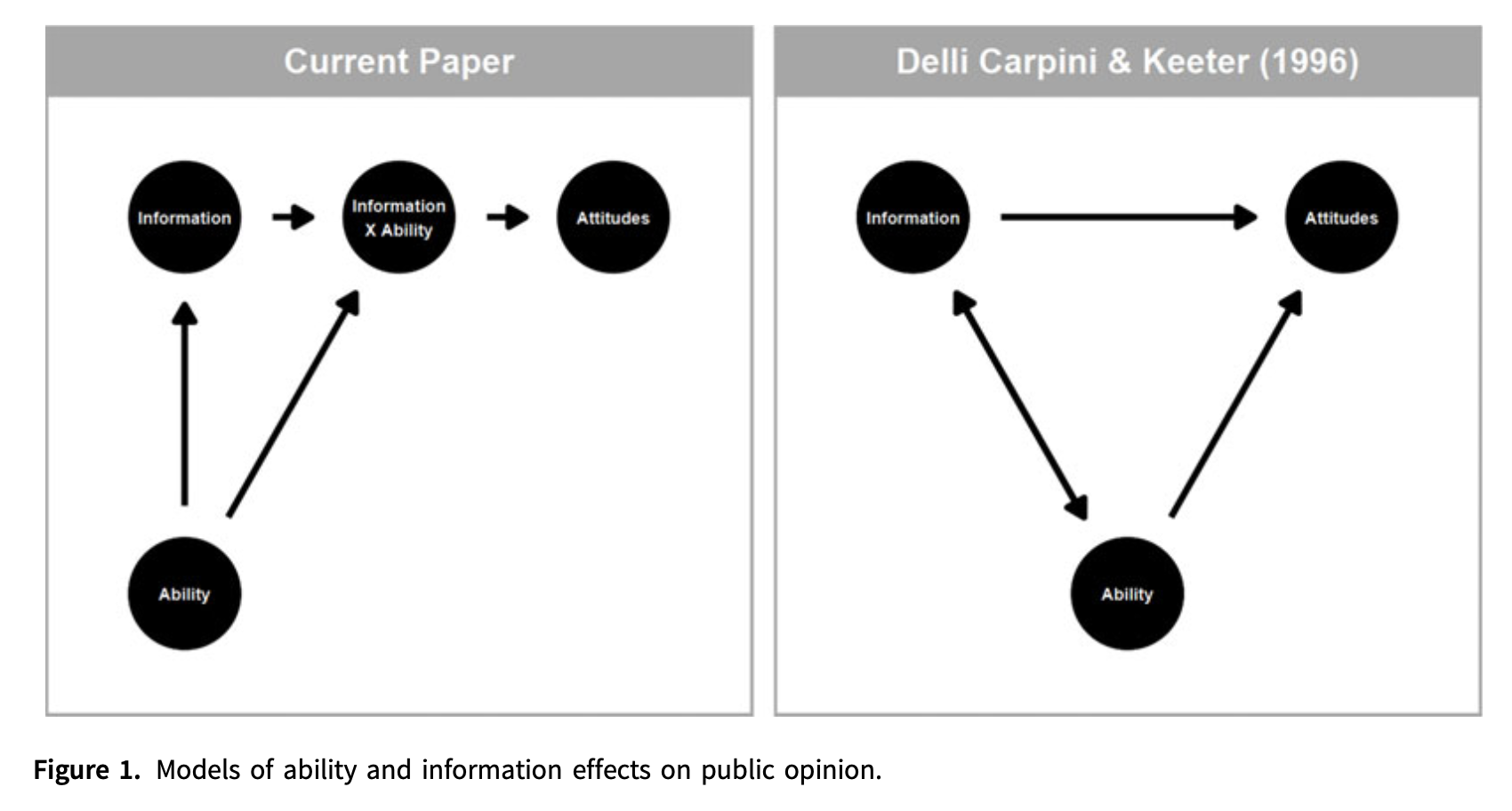
“My data consists of three American National Election Studies (ANES) panels spanning 2008–2010, 2012-2013, and 2016-2020, respectively.”
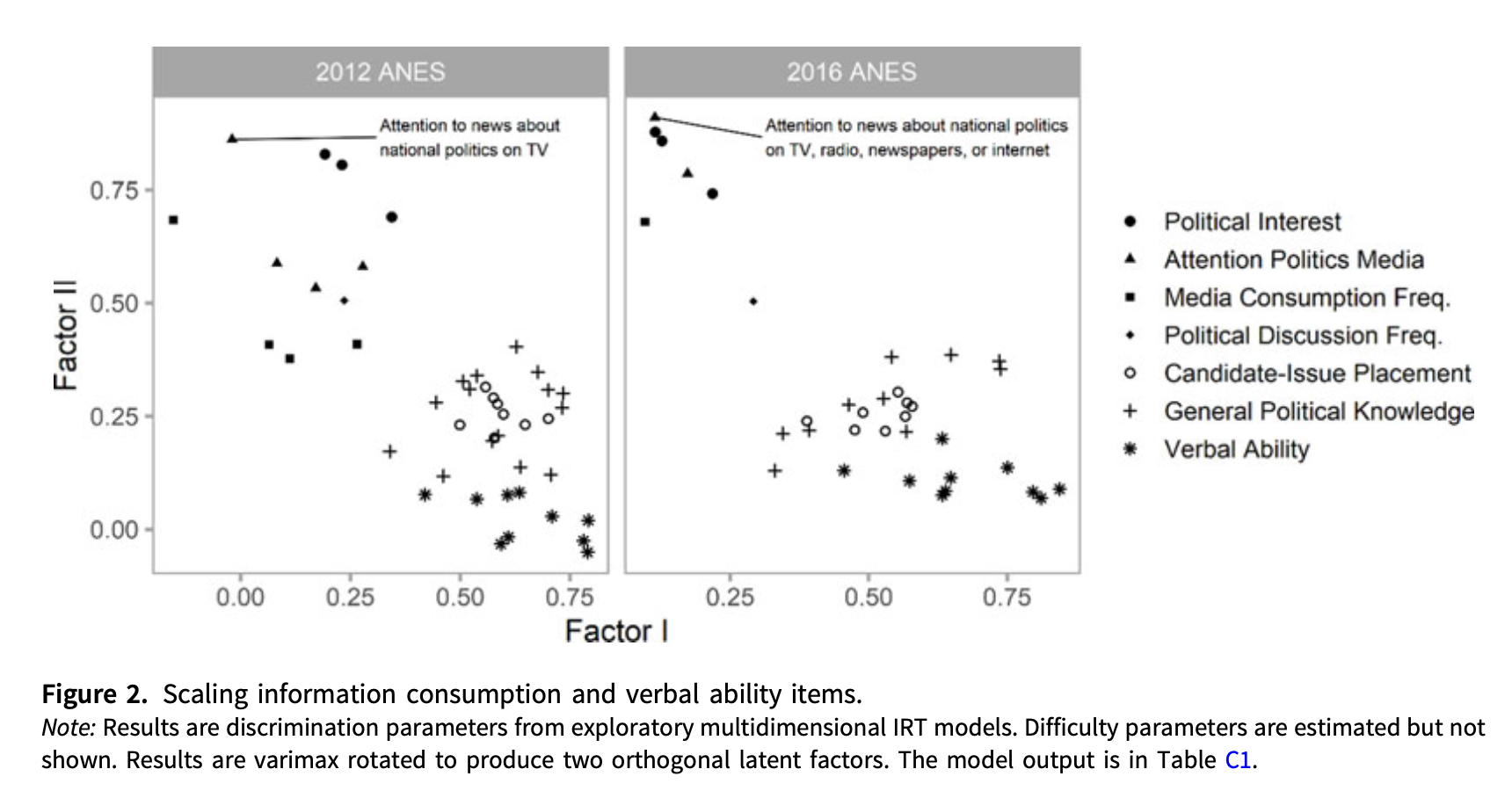
“Given that objective tests appear to be confounded with verbal ability, models that use them will effectively be interacting verbal ability (as measured by Wordsum) with itself (as measured by the objective tests). This should bias my results in a predictable way: Because respondents with low Wordsum scores and high knowledge scores will tend to be higher in underlying ability than those with low Wordsum and low knowledge scores, the marginal effect of information at low levels of verbal ability will be biased upward.”
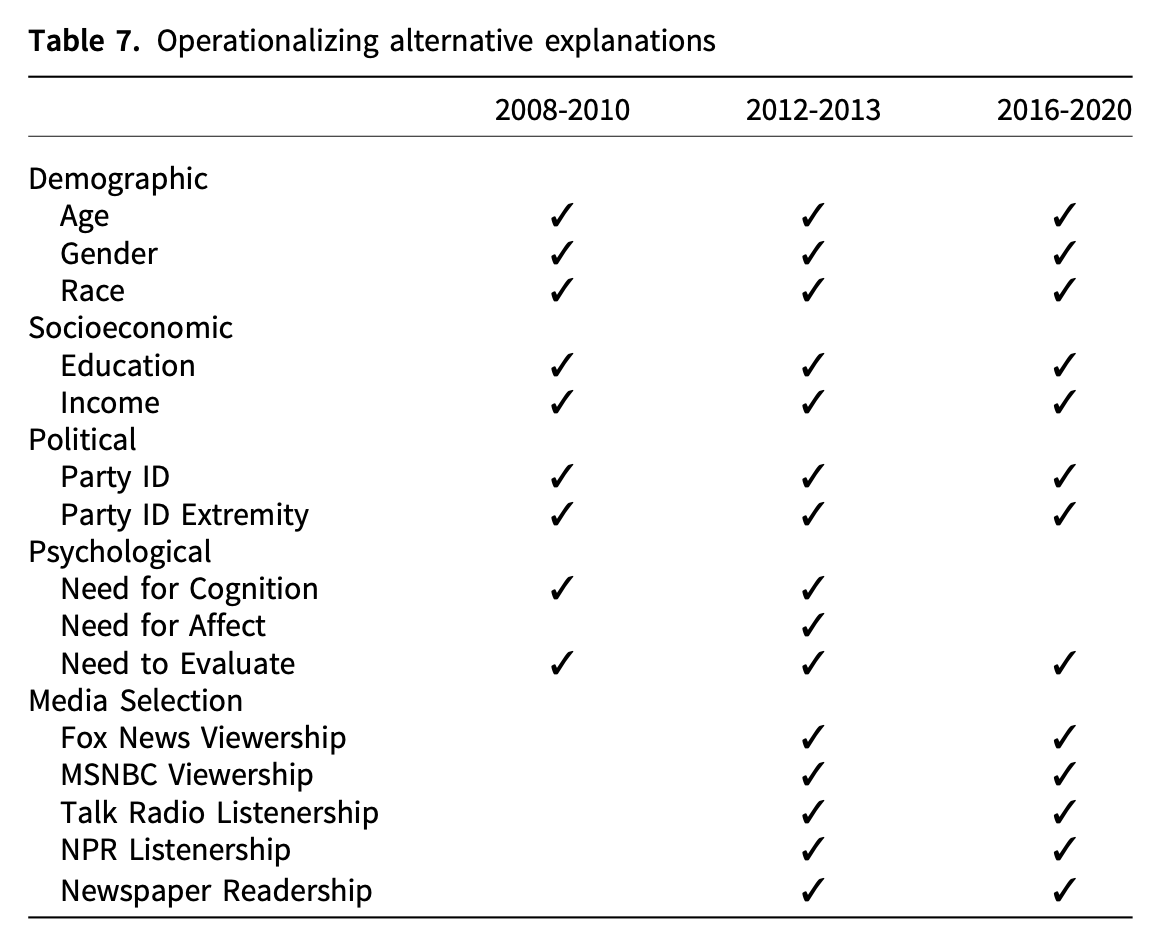
“Observers have long noted that, in America, the mass public and political elite share a secular faith: the belief that the greatest and most essential function of government is to ensure an equal voice in the political process (Arendt 1963; de Tocqueville 2002 [1835-1840]). With the advent of public opinion polling, we can now see just how far America falls short of this ideal in practice. Most citizens – particularly those with less money and education – do not have the influence on political outcomes that they theoretically could (Gilens 2012; Schlozman, Verba, and Brady 2012). Pessimistic accounts like Luskin’s, quoted above, view this as a regrettable but probably inevitable feature of mass politics.”
”Across three nationally representative panels, I find that Americans with low levels of verbal ability report attitudes that are less structured and less stable when they consume more political information. Thus, contrary to a widely accepted view in political science, these results suggest exposure to information tends to benefit citizens who are already skilled at parsing it while hindering those who already struggle to keep up. This dynamic may explain why the cheap and abundant learning opportunities afforded by mass media have failed to level the playing field between political experts and political novices (Kinder and Kalmoe 2017; Luskin 1990). Far from closing gaps in political fluency, an increasingly saturated political media environment appears to have left the less politically sophisticated ‘blown about by whatever current of information manages to develop the greatest intensity’ (Zaller 1992, 311).”
“Yet, the existence of ‘initial differences [in] raw materials’ makes it difficult to say whether information is the active ingredient that gives political knowledge scales their predictive power (Campbell et al. 1960, 255). Without research designs that can discern the unique effects of information and cognitive ability, we will be left without a clear understanding of how either influences political behaviour.”
Panish, A. R. (2025). Informed or Overwhelmed? Disentangling the Effects of Cognitive Ability and Information on Public Opinion. British Journal of Political Science, 55, e58.
Reader Feedback
“….no but think of it like what we just came through in the 2000’s with <<<digital transformation>>> right…isn’t it going to be much more of a problem of the ones that don’t adjust? And how many of them are getting the hype but not getting it?”
Footnotes
I learned last month that cell walls, like the ones in you right now, aren’t static. They’re fluids. The atoms in them don’t just jiggle, brown-around, in place fixed, like in a brick wall. No, it’s a fluid, with receptors and proteins all moving around. It blew me away. Changed the way I thought of mitochondria. About viruses lurking outside, iterating on a way to get on in the inside to that sweet sweet ribosome. Changed how I thought about complexity.
Complexity explodes when two systems touch.
It’s a convenient assumption that an LLM, a system unto itself, perfectly understands the state of two other fluid surfaces touching. I say convenient because if you have no intuition as to what it takes to integrate two systems, then you can just say, confidently with enough gusto for the board to buy it, that the Eh-Eye can already replace literally all the devs. I say convenient because I can’t accurately assess the interior state of others.
Is it delusion? Is it a trap to say otherwise? Is it a way to justify wrecking something with no intent to ever replace it? Is it literally what people just have to say, okay, stop asking about it what’s your problem making people upset stop okay?
MCP is useful technology. And yet it doesn’t just imagine itself into existence and work. And we haven’t yet all experienced the full pressures of natural selection and semi-conscious design kick in. If you’ve been reading this space – you know. It just seems oversold in some corners and undersold in others. It’s a complex complex?
There be dragons…and also…treasure!
Never miss a single issue
Be the first to know. Subscribe now to get the gatodo newsletter delivered straight to your inbox
